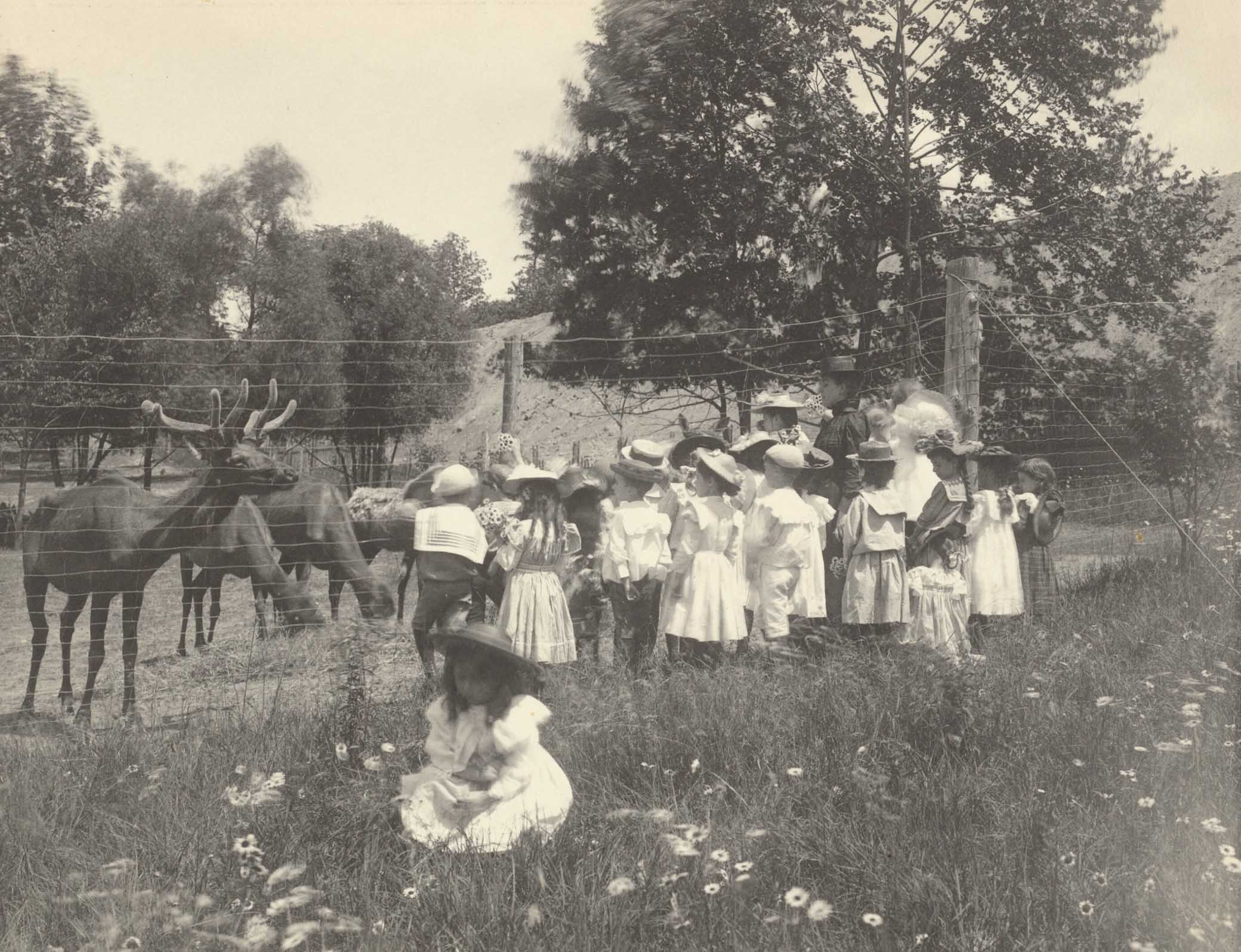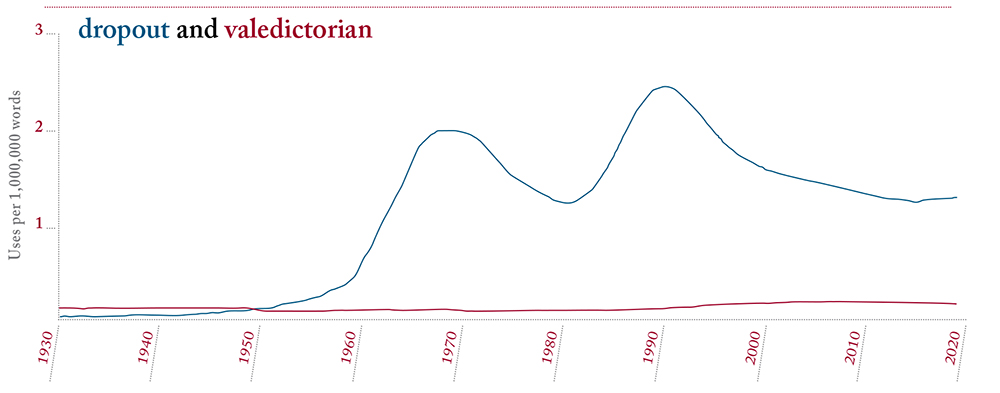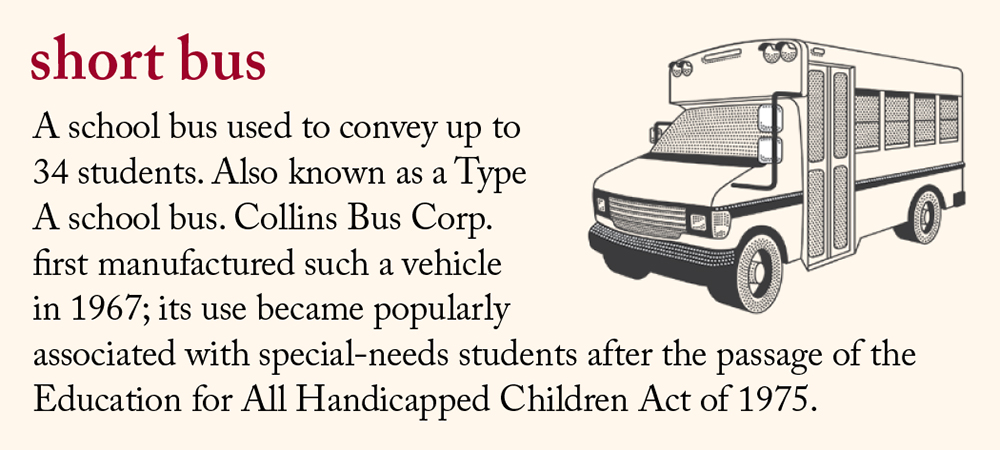
Schoolchildren Looking at Elk, c. 1899. Photograph by Frances Benjamin Johnston. The J. Paul Getty Museum, Los Angeles. Digital image courtesy the Getty’s Open Content Program.
academy: From ancient Greek Ἀκαδημία. The college of philosophy situated approximately a mile northwest of Athens’ Dipylon Gate, where Plato acquired property c. 387 bc; the academy continued for more than nine hundred years before the emperor Justinian closed it, together with other pagan schools.
Bildungsroman: (German) Lit. Bildung, education, and Roman, novel. A novel that has as its main theme a person’s formative years or spiritual education.
brainwashing: The systematic and often forcible elimination from a person’s mind of all established ideas, esp. political ones, so that another set of ideas may replace them. Probably after Chinese xı nao, brainwashing; from xı, to wash, cleanse, and nao, brain. First attested use: 1959. See indoctrination.
college boy: (U.S. slang) A prison inmate.
didactic: Of a teaching method, teacher: one that conveys knowledge by formal means such as lectures and textbooks, rote learning, etc. Frequently contrasted (often unfavorably) with teaching methods encouraging greater involvement or creativity.

education: “That which discloses to the wise and disguises from the foolish their lack of understanding.”—Ambrose Bierce, The Devil’s Dictionary
erudition: The action or process of training or instructing. Of a coin: perfect workmanship, finish. From Latin ērudītus, from ērudīre, to instruct, train; from ē, out, and rudis, rude, untrained.
gymnasium: A place or building for practice of or instruction in athletic exercises; a high school, college, or academy; spec. in Germany and other continental countries, a school of the highest grade designed to prepare students for university. From Greek γυμνάζειν, to train, exercise; lit. to train naked.
hooky: To be away from school without permission. Probably from the slang hook it, to make off. First use, 1842.
indoctrination: Instruction; formal teaching. Also spec. the instruction of prisoners of war, et al., in communist doctrines. “I will then pick up the organization man in college, follow him through his initial indoctrination in organization life, and explore the impact of the group way upon him.”—W.H. Whyte, 1956. See brainwashing.

knowledge box: (a) slang for the head, the brain; (b) frequently depreciative, a school.
learn: To acquire knowledge; from Old English leornian, Northumbrian liorniga, Old Saxon lînôn, Old High German lirnên, lernên. Not found in Dutch.
lore: The act of teaching; the condition of being taught. Also, in later use, applied to the body of traditional facts, anecdotes, or beliefs relating to some particular subject, e.g., animal lore, bird lore.
madrassa: In Muslim countries a school of Islamic theology and law; also more generally a school (esp. a secondary school) or institution of higher Islamic education.
matriculate: To enter a name in the register of a university, college, etc., esp. to admit as a member of a university, college, etc.
matura: Final exams young adults (aged 18 or 19) take at the end of their secondary education; the high school exit exam or “maturity diploma” in various European nations. Cf. A-level exams or Abitur.
normal school: Of, relating to, or intended for the training of teachers, esp. in Europe and North America. In North America, normal schools trained primary-school teachers. In Europe, different normal schools also trained teachers at secondary and tertiary levels. From classical Latin normālis, right-angled.
pedagogue: A schoolmaster, a teacher, esp. a strict, dogmatic, or pedantic one. “Cow’d by the ruling rod, and haughty frowns / of pedagogues severe.”—William Somerville, 1735
preceptor: A person who gives instruction; a teacher, a tutor. “History is a preceptor of prudence, not of principles.”—Edmund Burke, 1771
pupil: A person who is being taught by another, esp. a schoolchild or student in relation to a teacher. From French pupille, an orphan who is a minor and consequently a ward; from classical Latin pūpillus, an orphan, ward, minor; in postclassical Latin also a student.
ragged schools: Any of a number of free schools established in the United Kingdom from the early 1840s for the education of the poor. The need for such schools declined with the passing of the 1870 Education Act.
reformatory: An institution to which young offenders are sent as an alternative to prison, typically focusing on education and training rather than punishment.
retraining: The action or process of being trained again, esp. in order to learn new skills required to do a different job. First use, 1840.
scholar: (depreciative) A person who possesses academic learning or theoretical knowledge but lacks practical skills or worldly experience. “The scholar often appeared as a stock character in satires of the early modern period, depicted as an object of ridicule by courtiers and gallants, and mocked for being poor, unfashionable, and socially awkward.”—OED
school: (v.) To bring oneself under control; to direct oneself to do something or into a particular state by a process of self-control. “My deerest Cooz, I pray you schoole your selfe.”—William Shakespeare, 1606
school butter: (U.S. regional slang, chiefly Southern) A flogging. Used as a jeer or taunt for schoolchildren. “Cob, or cobbing: a punishment used by the seamen for petty offenses or irregularities among themselves…This piece of discipline is also inflicted in Ireland by the schoolboys on persons coming into the school without taking off their hats; it is there called school butter.”—Francis Grose, Classical Dict. of the Vulgar Tongue
schoolmarm: A woman who teaches in a school; a schoolmistress. Also, in extended use, a person exhibiting the prim or didactic behavior conventionally associated with a schoolmistress. Also, North American slang (chiefly forestry), a tree with a forked trunk.
school of hard knocks: A hard life, seen as a means of education.
schooly: Reminiscent or suggestive of a school or pupil; having the typical or traditional characteristics of a school.
science: “Certainty grounded on demonstration.”—Samuel Johnson, Dict. of the English Language

show-and-tell: A classroom exercise in which children display an item and talk about it. First use, 1941.
standardized test: Any test administered, scored, and interpreted in a standard, predetermined manner. The No Child Left Behind Act, which became law in 2002, mandated annual testing in reading and math (and later science) in grades three through eight and again in high school. The Kansas Silent Reading Test (1914–15) is the earliest known multiple-choice test.
teach: In shipbuilding, of a line: to point in a particular direction. “To teach, in marine architecture, is applied to the direction which any line or curve seems to point out.”—W.H. Smyth and E. Belcher, Sailor’s Word-Book, 1867
teacher’s pet: A derogatory term for a teacher’s favorite pupil. “The other employees in the department hated her and nicknamed her Teacher’s Pet.”—John Dos Passos, 1930
Explore Education, the Fall 2022 issue of Lapham’s Quarterly.